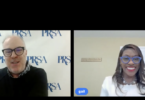The horrific event that shattered the global gathering of Boston Marathon participants and spectators brought into clear focus for me the vital importance of the meaning “together.”
As I monitored both social media conversations and traditional media coverage, one fact became abundantly clear: no matter who you are, where you are from, or in whom you believe…“no man is an island.”
This became abundantly clear as I noted in particular the conversations on Facebook of students past and present with and about their friends. They reached out, reassured, and reflected on the day’s events. A palpable sense of “community” permeated the day.
And, although in some cases the people themselves were hundreds if not thousands of miles apart, they were comforted individually and collectively by the knowledge that they were not alone…in their emotions, in their reactions, in their moments of anxiety…and relief.
This brought into clear focus for me one key value of the public relations profession…our charge to communicate with others, to foster and encourage a sense of community among our various stakeholders, and to help nurture an understanding of events and activities that impact our lives.
In a sense, this event serves to highlight one of the tenets of Arthur W. Page’s “Principles of Public Relations Management”: “Remain calm, patient, and good-humored…Lay the groundwork for public relations miracles with consistent, calm and reasoned attention to information and contacts. When a crisis arises, remember that cool heads communicate best.”
Public relations, as we all know so well, is so much more than helping a client or employer succeed as a business entity.
Yes, that is what keeps the figurative (or literal) food on our tables and pay our bills. But it also is what creates and nurtures a comforting cloak of understanding that knits disparate segments of our societies together and fosters cooperative communication that unites communities, societies, and nations.
It is my hope, as well, that public relations will enable us as human beings equipped with the frailties that make us human to once again get past the stark realities of the present and set our respective courses for the possibilities of a better future.
“For in the dew of little things, the heart finds its morning and is refreshed.” – Kahlil Gibran, “The Prophet”







The world we live in today is full of instant news and
constant use of social media, not only by reporters and news outlets, but by
the average citizen as well. The recent tragedies in Boston are the perfect
example of this instantaneous type of news. I believe that social media should
be used within the PR community to help foster a strong relationship between
clients and the public. As noted in this post, a key value of the profession is
“to communicate with others, to foster
and encourage a sense of community among our various stakeholders, and to help
nurture an understanding of events and activities that impact our lives.” I think
that it is important for PR practitioners to know that social media should be
used as a tool to help promote strong relations with the public, especially in
times of tragedy. I also agree that public relations should use this notion of
instant news to help bring about a better future, filled with hope for a more
accurate transfer of information. Social media is so often associated with a negative
connotation. I think that we should take a closer look at social media
interactions during tragedies, like the recent events in Boston. I think we
will find, as stated in this post, that people are brought even closer together
through social media connections, even if they are miles and miles away from
one another.